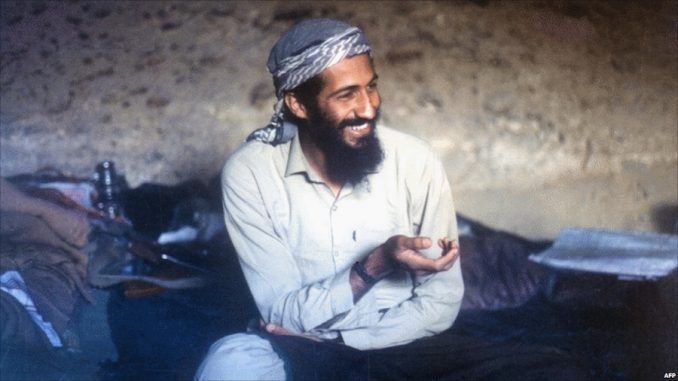
Around 1,500 audio tapes recorded between 1997-2001 were taken from Osama bin Ladens home and studied by a student at Yale University (after being discarded by the FBI).
In these tapes linguistic anthropologist Flagg Miller has written a book detailing the unexpected facts the tapes reveal about al-Qaeda – one of the biggest surprises being that al Qaeda did not declare war on the West, as previously reported.
Vice News reports:

BYPASS THE CENSORS
Sign up to get unfiltered news delivered straight to your inbox.
You can unsubscribe any time. By subscribing you agree to our Terms of Use
Here are several surprising discoveries.
First, Bin Laden was not al Qaeda’s leader at its outset — in fact, the organization sought to marginalize him. The “al Qaeda” frequently evoked in Western intelligence and law-enforcement circles referred originally to a specific training camp in eastern Afghanistan called Al-Faruq. Founded in the late 1980s, the camp was directed largely by Egyptian and North African militants who aimed to overthrow ruling regimes within the Islamic world.
These leaders found Bin Laden’s Saudi credentials and wealth suspect since Saudi support came with strings attached: don’t bring your revolution back home. My analysis of the collection highlights an overlooked clause in al Qaeda’s founding charter: “Neither the commander of the guards nor his associates can be from any of the Gulf States or from Yemen.” Prevented from hiring his most reliable Saudi and Yemeni bodyguards, Bin Laden had to look for support and market his efforts beyond the Islamic world itself.
Second, while al Qaeda is typically distinguished from other militant and terrorist groups for its unequivocal focus on attacking the West and the United States, the organization’s chief leaders prioritized multiple enemies, foremost among them authoritarian leaders within the Arab world. Bin Laden’s speeches from as late as 1993 avoid any public mention of directing militant activity toward America, despite the fact that massive US-led coalition forces had been stationed in his homeland for a full three years.
Bin Laden makes no mistake that Saudi Arabia is occupied: “Disbelief has surrounded the Land of the Two Holy Sanctuaries [of Mecca and Medina] like a bracelet coiled upon the wrist. We ask God to liberate Muslims everywhere and to protect our Two Holy Sanctuaries.”
Yet he continues by turning his rage against Muslims themselves: “From your East come Shia ‘Rejectionists’… And then there are those empathetic with them who turn away from the oppressed. Tune into the media broadcasts, if you wish. Their slogans are: ‘One Arab community with an everlasting message: Unity, Freedom, Socialism!'”
In the years ahead, Bin Laden would tone down internecine rhetoric, especially when speaking to world television audiences. Images of a single pan-Islamic network of terror found far greater uptake than ones of division.
Third, Bin Laden’s first and most notorious “Declaration of War against the United States” in 1996 was neither a declaration nor a call to war. These labels were given to Bin Laden by Western journalists and translators who sought to draw attention to growing Arab anger at the devastating effects of US-led sanctions against Saddam Hussein on Iraq’s people.
Featuring 15 poems often condensed or omitted from English translations, the speech is better understood as an epistle to the Saudi monarchy warning them of militant insurrection should they continue to sacrifice Arab and Islamic cultural values to Western secularism.
Security analysts’ neglect of reports about his penniless and isolated status at the time suggested to Bin Laden how accentuating Western fears could play to his advantage.
In Arabic, the term al Qaeda means a “base” or “rule.” Only once in the tapes is the term evoked by speakers in the collection in the sense it is typically used today: as Bin Laden’s global jihadi organization dedicated to attacking the US. This depiction was floated in March 2001, well after the idea had been picked up and amplified in the West.
On countless other occasions, the term al Qaeda is employed in sermons and lectures about founding precepts in Islamic ethics, theology, law, and linguistics. Reliance on scholarly consensus and precedent is paramount, yet paying homage to established tradition complicates the views of militants who focus on radicalized “base-camps” and who, like Bin Laden, tried to steer listeners toward a longer-term battle with the West.
The tapes in this collection ultimately show how evocations of al Qaeda have evoked more dissonance and controversy than agreement. This is all the more so given that most of al Qaeda’s victims, whether before or since 9/11, have been Muslims living outside the West. Any understanding of al Qaeda’s ideology, goals, and strategy must take account of its deep roots within the Arab world. To overlook this context in favor of al Qaeda’s global jihadi portfolio is to risk giving the organization undeserved coherence and, with it, greater influence.


